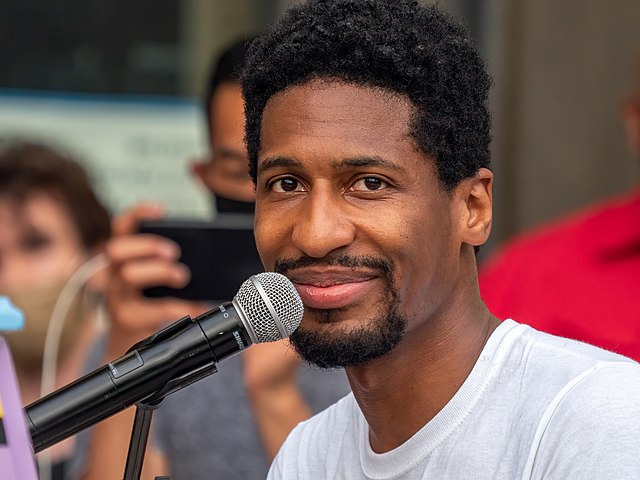The 64th Annual Grammy Awards, held Sunday at the MGM Grand Garden Arena in Las Vegas, seemed rather tame in comparison to last week’s hectic and disastrous Academy Awards. Irritatingly, the infamous Smith-Rock debacle was referenced by multiple presenters, including host Trevor Noah.
To some degree, stating that this year’s Grammys were milquetoast is entirely fair: out of context, the Grammys featured the unexpected domination of Jon Batiste (eleven nominations and five wins, including Album of the Year) and 95-year-old crooner Tony Bennett (receiving five nominations and a win). But even Googling “Trevor Noah Grammys” yields dozens of articles about the Will Smith slap and the Will Smith slap only — indicating how this year’s Grammys exists comfortably in the shadow of more significant contemporary events. Still, the award show found profound moments to revel in the power of the art form it is dedicated to celebrating while remaining an entertaining display of some of the year’s most interesting talents.
Many crowd-pleasing musicians took home some of the biggest awards of the night. The masterfully modular “Leave the Door Open,” by Silk Sonic, the lovechild of Bruno Mars and Anderson .Paak, took home Record of the Year and Song of the Year. To no one’s surprise, Olivia Rodrigo had three trophies to her name by the end of the evening: Best Pop Vocal Album, Best Pop Solo Performance and Best New Artist. During the rock segment of the ceremony, Foo Fighters took home three awards in the mournful wake of drummer Taylor Hawkins’s tragic passing.
In a surprise upset, however, Jon Batiste took home the night’s biggest prize for his album “We Are,” a combination of soul, gospel, hip hop, funk and R&B. It’s difficult to tell if the record is emblematic of a change of heart for the Recording Academy: the album charted for only one week on the Billboard 200 — at position 86. That observation is not a dig at “We Are” as an artistic statement but rather a contextualization of its place in the music industry. According to Billboard themselves, “Of the 64 Album of the Year winners, 61 — or 95% — have hit the Billboard 200’s Top 10.” They go on to state that “We Are” is the lowest-charting album of the year winner in the history of the Grammys. Impressively, it appears that the Recording Academy has — unlike their politically aware award ceremony — placed itself in a vacuum wholly separate from the last year, judging music by the intrinsic artistic merits that rest outside of the realm of backdoor dealings or extensive marketing campaigns.
It may not be that simple, though. For years, critics have (correctly) pointed out the role that artists, their managers and especially their labels play in influencing the opinion of the Academy. With this phenomenon in mind, perhaps the corporation overseeing Batiste’s Verve Records, Universal Music Group — maybe not coincidentally the biggest music company in the world — did some heavy lifting for the artist in the form of massive consideration campaigns or voter-targeted publicity. To less-convinced viewers, however, it seems as if chart placement has taken a backseat to adventurous musicianship and new ideas in the eyes of the Academy. Due to the notoriously opaque nature of their selection and voting process, one may never know the true answer behind how any of these award-granting decisions are made.
Beyond the awards themselves, the show took an important opportunity to shine a light on contemporary issues plaguing society today. Trevor Noah commented on the political nature of the award show in a pre-ceremony interview with the New York Post, saying, “I think the show is going to find the right place and the right space to do something. It’s one of those interesting balances in life we try to achieve, which is acknowledging what’s happening in the world whilst allowing yourself the grace to celebrate some of the moments that are also going on.”
The show seemed to deliver on this promise. In one of the more poignant moments of the night, a pre-recorded video from Ukrainian President Volodymyr Zelenskyy featured a bold and declarative statement of the power of music in times of struggle: “Our musicians wear body armor instead of tuxedos,” Zelenskyy said. “They sing to the wounded in hospitals, even to those who can’t hear them. But the music will break through.” Filmed in a bunker, the clip introduced a performance of John Legend’s “Free,” featuring Ukrainian artists Mika Newton and Lyuba Yakimchuk.
The ceremony featured many more enthralling performances, as the usual suspects all gave fantastic renditions of some of the year’s biggest tunes. BTS performed “Butter,” Olivia Rodrigo contributed a heartbreaking rendition of “Drivers License” and Lil Nas X had an especially notable moment with a medley featuring three of his catchiest pop nuggets. As a welcome addition, bluegrass guitar virtuoso Billy Strings was given a moment on stage to effortlessly leap across his fretboard and deliver a fiery performance of “Hide and Seek.”
It may be cliché to point out how an award show reflects aspects of contemporary society, that being the exact thematic point of the ceremony, but this year’s Grammys painted a lingering picture of a ceremony existing in a world far removed from tuxedos, gala ballrooms or elaborate set pieces. However, it simply isn’t possible to see this as a welcome moment of change for the ceremony: the ruthless capitalism of major label consideration campaigns, the needless suffering overseas and a desire to escape the pain of day-to-day life were all bubbling under the surface of this show, unable to escape for fear of ruining the spectacle.
Editor’s Note: This article is a review and includes subjective opinions, thoughts and critiques.
